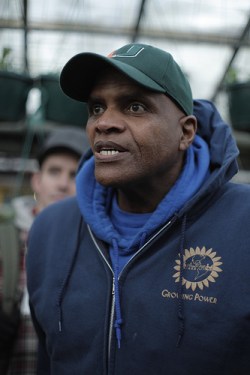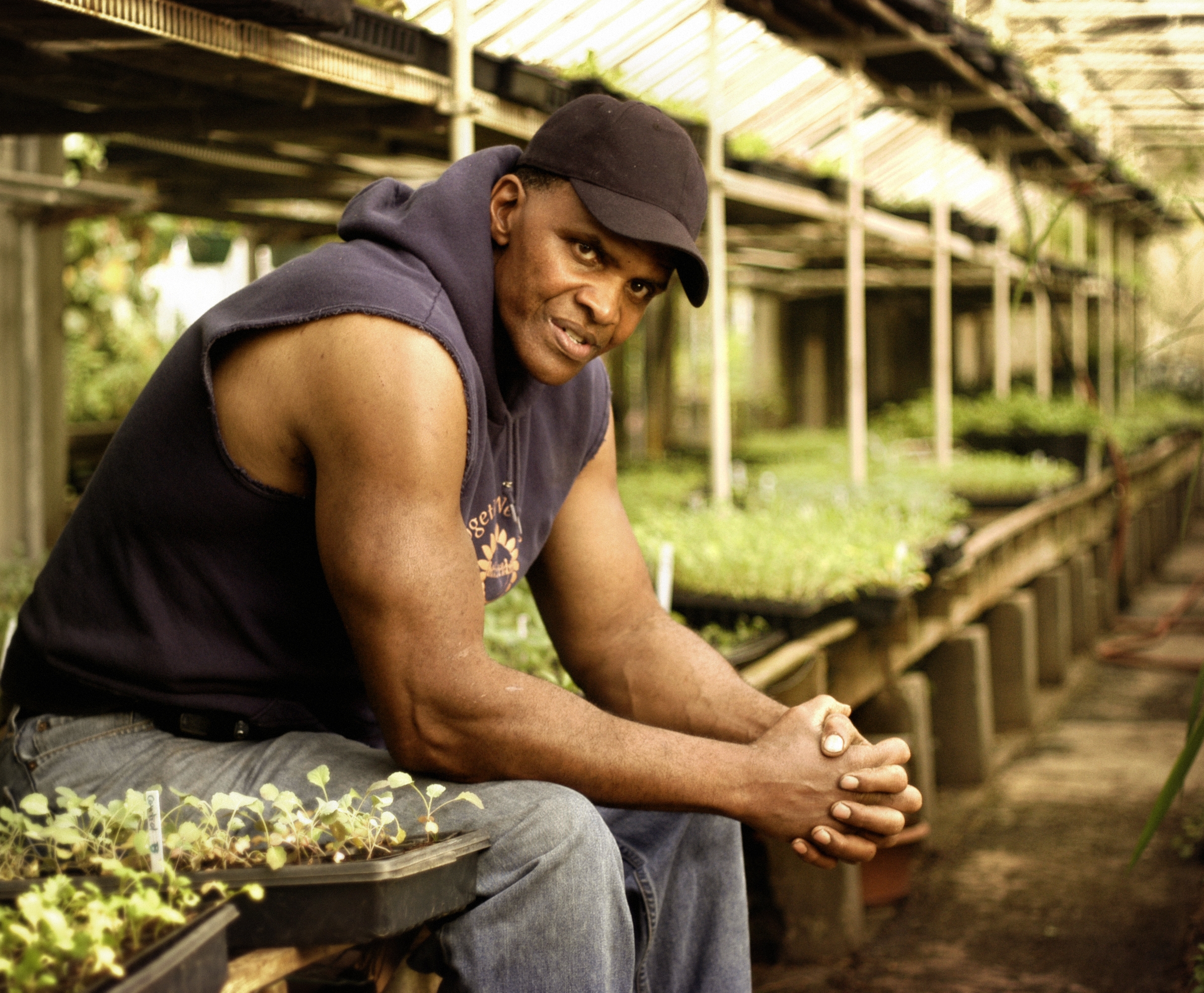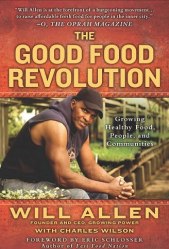
Will Allen. (Photo by Growing Power.)
In his new autobiographical book, The Good Food Revolution: Growing Healthy Food, People, and Communities, we see a different side of MacArthur Genius and urban farmer Will Allen. The book takes readers behind the scenes to witness the process of trial and error behind Growing Power, the Milwaukee-based urban farm, CSA, and youth training program that put Allen on the map.
But The Good Food Revolution is much more than a how-to guide. The story extends back to Allen’s family’s escape from sharecropping, his childhood on the land, the basketball career that pulled him out of poverty and allowed him to travel, his work for various corporations — including a stint at KFC and one at Procter and Gamble — and his eventual return to farming. Alongside his own story, Allen also recounts the stories of several people who were instrumental to building Growing Power with him, many of whom experienced their first reliable and fulfilling job on the urban farm.
We spoke with Allen recently about the book, the obstacles it chronicles, last year’s gift from Walmart, and the legacy he hopes to pass on.
Q. What was it like revisiting those early days and exploring your family history?
A. My family was part of the “great migration” north and my parents got away to the Washington, D.C., area. But the fact that my father still wanted to farm was a little unusual because most African Americans who had been involved in sharecropping in the 1930s pretty much wanted to leave behind that painful history. And the fact that my father wanted to pass on his agricultural roots to my brothers and me was unusual (so many farmers didn’t, and the results are obesity, heart, disease, etc. — all those things that come from being disconnected from our food and from eating bad food).
When I was first starting out in urban ag many years ago, I would go and work in communities and people would ask me, “Why are you doing that slave’s work?” I don’t hear that today, but back then I did often.
Q. You talk about the historical discrimination against black farmers by the U.S. Department of Agriculture — and their near disappearance in recent decades. Do you think Growing Power and projects like it have made more young black people want to farm?
A. Yes. First of all, we’ve had the first lady’s Let’s Move effort, and that has moved a lot of people to want to grow food in their backyards.
But I also think young people seeing me — a person of color — involved in growing food has helped many of them want to do what I’m doing. We train about 1,000 people a year and many also come back and work with us. [Growing Power now has 150 employees.] We’ve also seen a lot of farms get going since 2000 when I first started these hands-on trainings.
Q. You talk about the family that lived at the farm — a woman named Karen, who’d had a lot of hard luck before she started at Growing Power, and her son and daughter DeShell and DeShawn. Why did you choose to include their stories in the book?
A. They were just three examples of the many folks who have come from tough, stressful situations, and who I’ve seen go through a transformation by being connected to their food and the system that we developed at Growing Power. I’ve seen a lot of people come out the other side with nice lives and occupations, and even become leaders in their community — people who may have thought they’d never get beyond the challenges they faced. So I thought it was important to put a human face on the issue.
Q. Soil is a big part of the Growing Power story. What percentage of the work done there would you say goes into building soil?
A. I’ve spent a lot of energy over the years building relationships to be able to collect millions of pounds of food waste and carbon waste, and we compost it into high-quality soil. So you have to be able to build those relationships; then there’s the act itself. And you need a suitable place or process that doesn’t disturb the neighbors. We’ve composted over a million pounds of food waste at our national headquarters, 200 feet away from our neighbors. And part of that process involves engaging the community — in our case the neighbors know that we’re providing fresh food and education to the kids, and they really see it as an asset. So they’re not going to call the city if there’s a problem.
Growing food is all about the soil — especially when you’re doing organic farming. You have to grow soil. We’re in the city where all the soil is contaminated, so we grow compost and put two feet of soil on top of packed soil or concrete to grow food. And we now have food growing on about 200 acres in the city.
Q. Do you want to talk about the vertical farm Growing Power has in the works?
A. It will be the first true vertical farm. It’s a $12 million building. There are all these architectural renderings of 50-story buildings and no one has really built one yet. So we’re going to quantify the work and energy involved and tweak it, and study aquaponics, etc. It can be a model for other vertical farms.
These farms will be necessary in the future because many cities don’t have a lot of land mass. And the way we’re getting food into our cities now just isn’t sustainable. We’re also working with the universities to create a nutrition and agriculture institute starting our with master’s and doctoral students who are involved in food system work.
Q. There was a lot of controversy about the million-dollar gift Growing Power accepted from Walmart last year. Do you want to talk about that?
A. First off, that money came from the Walton Foundation — many companies have a separate foundation — like Kellogg’s and the W.K. Kellogg foundation. The Walton Foundation has done some good things. And there was some misunderstanding about the gift, because we actually passed on that funding to organizations around the country that were really struggling and need training and resources to be able to move forward.
I worked for a large corporate company and, believe me, you can always find many things you don’t agree with. But I think we need to really change our attitudes when it comes to getting everyone to the table. Because the reality is that Walmart delivers a great deal of the food in this country and we need to get our local food into their stores.
It’s easy to look at things in an idealistic way — but if you’re working with people in a disadvantaged community, you know the situation is dire.
Many insurance companies that we use today were the biggest supporters of slavery. So are we going to go back and say we’re not going to do business with you because we supported slavery?
I think we have to be more open if we’re going to change our food system — because this is really about our basic survival. People are getting sicker and sicker every day. The latest estimation I saw was that by 2030, 42 percent of Americans will be obese. We have the greatest resources of any nation in the world, so why is one out of six young people going to bed tonight without a meal? You go to native reservations and 50 percent of the folks have diabetes. So we have these terrible problems that are leading to our demise. And while it’s easy to complain, people need to jump off their computers, get out in their communities, and do something about it.
Q. Back to those early days of your project. Do you have any advice for those who are in debt and making their way through the early stages of an ambitious project?
A. You really have to have patience. It takes a long time to learn to farm. And it takes a long time to build an organization.
I hope [Growing Power] can cut the learning curve by passing on the lessons I’ve learned. I was naïve in ways. I didn’t even have a business plan. I bought a piece of property when I was still under-capitalized, and then I had broken boilers and buried gas tanks, etc., to deal with. But I was just so excited to get the property; excitement can blind you.
Growing Power has spawned a lot of similar projects around the country. More people under 40 want to do this work than they did 10 or 20 years ago. They have great ideas. But our responsibility as elders is to pass on what we’ve learned to this next generation, and that’s basically what I’m doing — trying to hand off as much as I can before I’m back on the farm, so to say.





